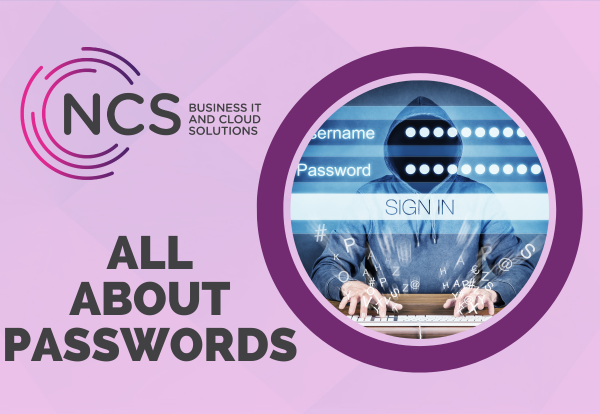All About Passwords
This week, we’re going to delve into the world of passwords. These essential security components play a crucial role in safeguarding our digital lives.
What is a password?
- A password is a sequence of characters used to authenticate a user and grant access to a system or application.
- Typically, passwords are used in conjunction with a username or email address to verify identity and allow entry into the desired system or platform.
- Remember: Confidentiality is key! Never share your passwords with anyone.
There’s lots of different types of passwords:
- Alphanumeric Passwords: combinations of letters (both uppercase and lowercase) and numbers.
- Passphrases: longer phrases or sentences that are easier to remember.
- Randomised Passwords: generated by password managers, ensuring high complexity.
- Biometric Passwords: based on unique physical characteristics (e.g. fingerprints).
- PINs: short numeric codes (commonly used for mobile devices).
- Pattern Locks: used on touchscreens by connecting dots in a specific pattern.
Check your password health
Microsoft have a new Password Health Indicator which is a great tool to check your password health.
How can we make our passwords more secure?
- Multifactor Authentication
Multifactor authentication (MFA) is an extra layer of security which makes it harder for hackers to attack and to gain unauthorised access to your email account.
When you sign into your online accounts, you have to prove you are who you say you are, in order to gain access. Traditionally you have done this by inputting your username (or email address) and a password.
Unfortunately, this is not enough anymore. Usernames are easy to find or guess (especially if it is your email address) and people tend to pick simple passwords or use the same password on multiple sites to make it easier for them (anyone using password1 still?)
This is why most online services including banks, social media, shopping, and your Microsoft 365 account, have added Multifactor Authentication to make your account more secure.
We have been recommending our customers use MFA for a while, and have made a decision to add MFA for FREE to all of our customers with Microsoft 365 email accounts. Going forward we will also be adding MFA as standard to any new Microsoft 365 accounts that we set up.
You can find out all about MFA on our blog post here >
- YubiKeys
YubiKeys are literally a key-sized device, similar in size to a USB memory stick, which you can plug in to your laptop or PC as a multifactor authentication (MFA) method. It can work with business and home software, especially logins to Microsoft, Google and Meta (Facebook, Instagram) services.
But instead of reaching for your phone to open an authenticator app or approve a login, you can simply touch the YubiKey to verify and you’re in. Once an app or service is verified, it can stay trusted. It’s that easy.
YubiKeys offer the most secure passkey authentication approach that accelerates the move towards a passwordless future, and stops account takeovers in their tracks.
You can read more about YubiKeys on our website here >
- Password Managers
Consider using a password manager to securely store and manage your passwords. A password manager lets you store all your passwords in one easily accessible place. Instead of trying to remember each password, you can rely on the manager to keep them secure.
Some internet browsers such as Edge and Chrome have password managers browser extensions built in. Smartphones also have these which allow you to store your passwords and access them when you need to (usually with a MFA method attached) or they can autofill when you try to login to accounts (if that password is stored).
There is also password manager software available which can be used on multiple devices which can give you more flexibility.
Using a password manager allows you to use unique and complex passwords for each online account without having to remember them all. Cybercriminals often exploit reused passwords, so having distinct ones is crucial for security
To find out more about any of these or to discuss your business’ password protocols, get in touch with our Sales team.
Posted in News


